The Moscow trial of the three members of the punk rock group Pussy Riot (whose “crime” was the subject of my previous report “Religious Conflict In Russia”) was in the center of public attention this past week not only in Russia, but also all over the world.
Here is one example – the front page of Liberation, the most popular French paper.
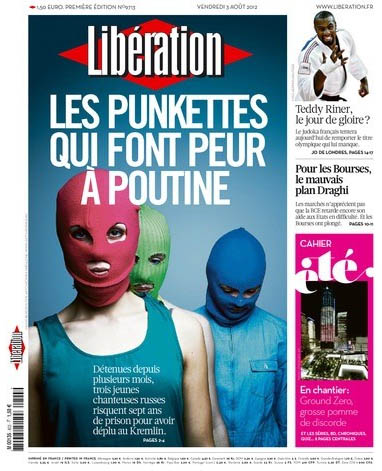
The trial had substantial coverage also in American media. Here are an article and an Op-Ed from the New York Times.
http://latitude.blogs.nytimes.com/2012/08/06/the-shame-of-putins-courts/
http://www.nytimes.com/2012/08/07/opinion/on-trial-putin-v-pussy-riot.html?pagewanted=all
None of the American publications had provided specific details of the trial, which in my opinion are very important for the understanding of the present-day situation in Russia.
Here is my attempt to describe a day of those three young women during their trial. This reconstruction is made on the basis of reports from many Russian Internet publications, not only concerning just the trial of Pussy Riot. I am told all suspects jailed without bail are treated similarly in Moscow.
At the day of the trial, those who should go to courts are gotten up around 5:00 AM, an hour before of all the other prisoners. Then these suspects wait for hours for the arrival of a paddy wagon to transfer them to court. They wait in a prison’s assembly room that has neither windows and/or air conditioning.
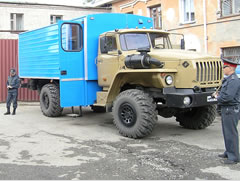
There are six prisons in Moscow that hold prisoners awaiting their trials. Usually there’s only one paddy wagon which is assigned to pick up prisoners from all prisons and bring them to different courts. Moscow is infamous for its traffic jams. So the paddy wagon’s morning trip typically takes about four hours.
The Russian paddy wagons are iron boxes without windows or air condtioning.
In the Summer time those who are inside of the wagon feel like they are inside of an oven. They are not given anything to drink and not permitted to go to bathroom.
Prisoners who are to go to courts are given “dry food”. Usually it is dried soup that can be eaten only after it dissolved in hot water. A prisoner can get a glass of hot water from a guard only as a special favor.
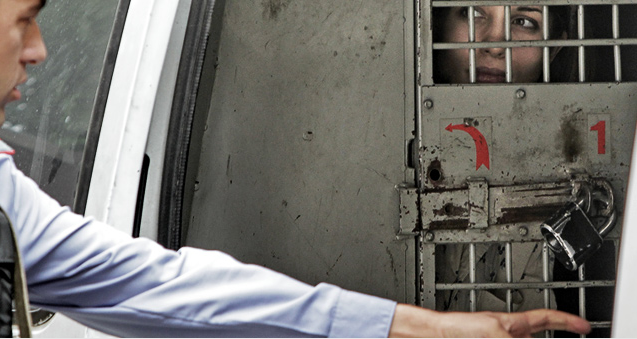
The paddy wagon arrives at the court around 9:00 AM. The trial can start as late as 1:00 PM. Suspects spend another 4 hours in the airless, barred dark room, where one cannot write or read, restricted from contacts with anyone, even their lawyers, which is an obvious violation of law.
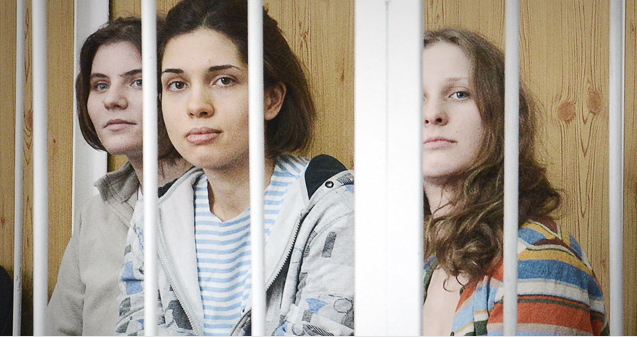
They are guarded continuously by police with dogs.
The night trip back to prison is similar to the morning trip. They arrive back at prison around midnight, when the lights in prison are turned off and there is no way to get even water to drink. And they are required to rise at 5:00 AM again the very next day. This routine is repeated every day, five days a week.
During the trial defendants sit in the bullet proof sealed glass “aquarium”, which has no ventilation or air conditioning. They cannot communicate confidentially with their lawyers and observe materials presented at the trial. Those are undoubtedly violations of the law.
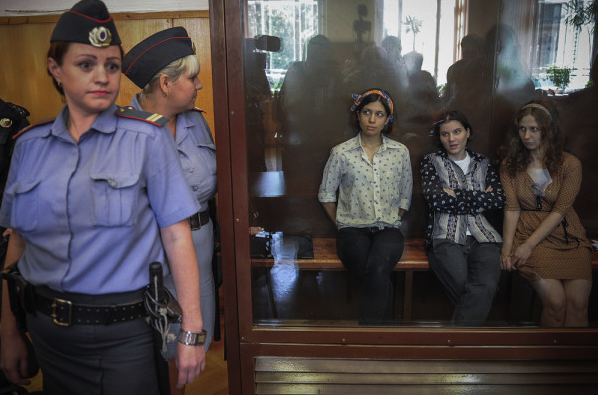
Some defense witnesses, among them an old woman who is a famous writer and a middle aged leader of Russian Muslims, were thrown out of the court building and beaten up by police.
The Court not only demonstratively violates the law, the trial is a mockery, reminiscent of the theater of the absurd.
Here is an excerpt from a translated transcript made during the trial:
Guard with a ferocious police dog, a Rottweiler, stands next to the defense attorney Violeta Volkova. Every time when Volkova starts speaking, the Rottweiler starts barking.
“Guard: (to the attorney) You speak too loud. It irritates the pooch.
“Volkova: (to bailiff) Please, take the pooch away.
“Bailiff: I can’t take the pooch away. The pooch is on duty.
“Judge: The pooch stays.”
Ten minutes later, Volkova is trying to answer the judge’s question, but the dog starts barking again, overpowering her voice.
“Volkova: Why wouldn’t you take the dog away?
“Bailiff: Speak in low voice, dog will not bark.
“One of lawyers: There is a sign at the entrance: “Animals are not permitted.”
“Guard: It’s not an animal; it’s a special device”
In another five minutes Volkova moves her hand – the dog starts barking again.
“Volkova: I can’t speak without gesticulating! Please, please take the doggie somewhere!”
The Court is expected to deliver its verdict on August 17.

